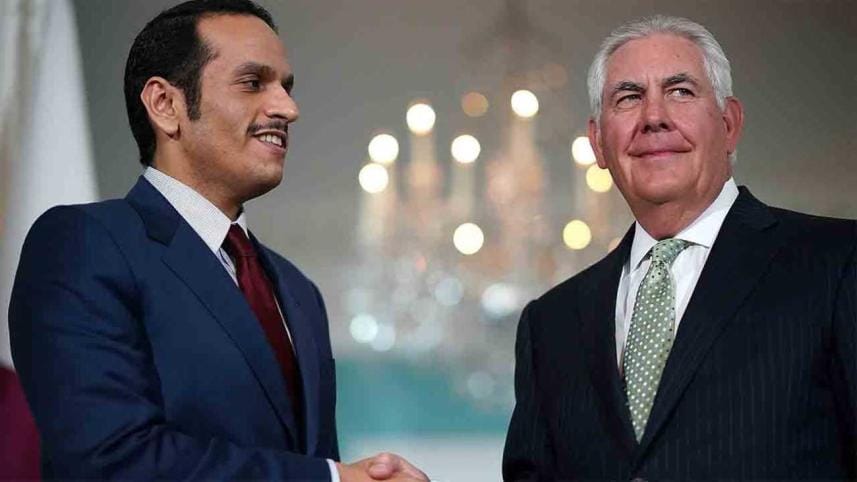A defiant Qatar stands its ground

The crisis that began in the Gulf on June 5, 2017 does not seem to be ebbing. In the meantime there have been some twists and turns in this sordid episode.
Raising the stakes higher on June 23, Kuwait, on behalf of the so-called Anti-Terror Quartet (ATQ)—Saudi Arabia, UAE, Bahrain, Egypt—presented Qatar a list of 13 onerous demands. Qatar was asked to comply with the demands within 10 days. The demands included stipulations that Qatar curb relations with Iran; shut down Al Jazeera; remove Turkish troops from its soil; end contact with groups such as the Muslim Brotherhood; sever all ties with terrorist organisations, etc.
On July 3, Qatar's foreign minister arrived in Kuwait with a hand-written response to the demands of the Arab quartet. When a defiant Qatar rejected the demands, considering them as unrealistic and as an attack on its sovereignty, ATQ threatened stricter measures to compel Doha to fall in line.
Both Iran and Turkey came out in support of Qatar. Turkey started airlifting food to Qatar as the supply situation became dire. Iran too has been shipping fruits, vegetables and fresh water to the beleaguered peninsula. Ankara already has 113 Turkish servicemen in Qatar who are engaged in joint exercises with Qatari air force. Tehran has again called for dialogue between Doha and ATQ. Russia, keen to get involved in the region, has also called for a negotiated settlement of the crisis.
A new dimension to the crisis was added when on July 10, US Secretary of State Rex Tillerson visited Doha in an effort to resolve the standoff. On July 11, Tillerson and Qatari foreign minister Al Thani signed an MOU (text not revealed) on combating terrorism and its financing. One wonders whether Trump and Tillerson are on the same page on Qatar. Meanwhile, French foreign minister Jean-Yves Le Drian also visited ATQ countries to help resolve the crisis.
The American move can be interpreted as a strategy to ease the pressure on Doha, and also obtain commitment from Doha that it will not support terrorism. Besides, Washington does not want Russia fishing in the troubled Gulf waters. Tillerson also travelled to Saudi Arabia and Kuwait before leaving for Washington on July 13. The MOU did not satisfy the ATQ and it continued to demand Qatar comply with the 13 demands before any negotiations. Thus the deadlock remains.
In order to appreciate the current confrontation between Saudi Arabia and Qatar one has to look at the post-colonial creation of states in the Middle East. Dominated by Arab Muslims, Middle East has a turbulent history. This is primarily because the region assumed immense economic significance when oil was discovered in the Arabian Peninsula in the late 1930s. The desire for control of this crucial energy resource has made this region a playground of world powers.
As colonial powers Britain and France withdrew from the region after WWII they left behind small independent feudal entities. The secret Sykes-Picot Agreement of 1916 was the basis on which territorial boundaries were arbitrarily drawn by the British and French—totally disregarding their religious and tribal affinities. The rulers were handpicked by the colonial powers and installed as kings, emirs and sultans of these states. Obviously, the aim was to keep them under some form of control so that oil supply to the West would continue at throwaway prices.
The instruments used by the West were ingenious: provoking wars and instilling schism between the Shias and Sunnis. To further tighten the noose around these hapless states the West also helped create Israel in 1948 to dominate the region militarily on behalf of the West.
The history of wars in the Middle East is all too familiar for repetition.
The strength of these states lies mainly in its oil revenues. And the rulers of all these states are in fact autocrats with scant respect for democracy, free press or human rights. Indeed, these countries suffer from high political instability.
Qatar too has an authoritarian regime where democracy is non-existent and rights of expatriate workers are systematically violated. Qatar is not the epitome of the lofty ideals it has been propagating. Sunni Saudi Arabia is fearful of the Muslim Brotherhood allegedly befriended by Qatar. The Al Jazeera media network promoting democracy and open journalism has unnerved the authoritarian regimes of ATQ. And then the fear of Shiite Iran is all too pervasive in the Gulf region.
This not the first time that differences between Saudi Arabia and Qatar have cropped up. As the Arab Spring destabilised the Arab world, Saudi Arabia cut off relations with Qatar in 2014 fearing that Doha was fomenting an uprising against the House of Saud. Political instability in the GCC arising out fear of change is the main cause for these crises.
After the military intervention in Yemen, Saudi Arabia cannot possibly go for a military solution and change of the Thani regime because of Turkish military presence and the American airbase. It has to rely on economic and diplomatic pressure on Qatar.
Fortunately, the diplomatic showdown so far, has not spilled over to the expatriate community. There are fears that in order to gain support from countries like India, Pakistan, Bangladesh, Indonesia, etc., which send migrant workers to GCC, both Saudi Arabia and Qatar may threaten to expel them.
As a defiant Qatar stands its ground, a peaceful resolution has become imperative not only for the Gulf but also for the entire region.
Mahmood Hasan is former Ambassador and Secretary.




Comments